Full Disclosure: ScreenAnarchy's Lists of Shame - May (Part 1)
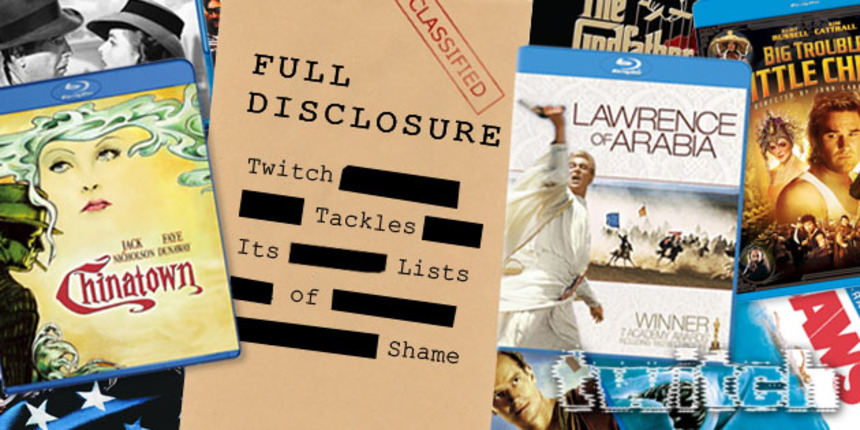
In our ongoing quest to conquer the various indomitable beasts of World Cinema that have until now evaded us, Team ScreenAnarchy has finally laid claim to works from venerable cinematic masters who span both the globe and most of the last century. May proves no exception, with acclaimed works from Martin Scorsese, Michelangelo Antonioni, Frank Capra, Billy Wilder and Charles Chaplin finally struck off our collective list of shame, feats that inch us ever closer to the elusive green light of cinephile completism.
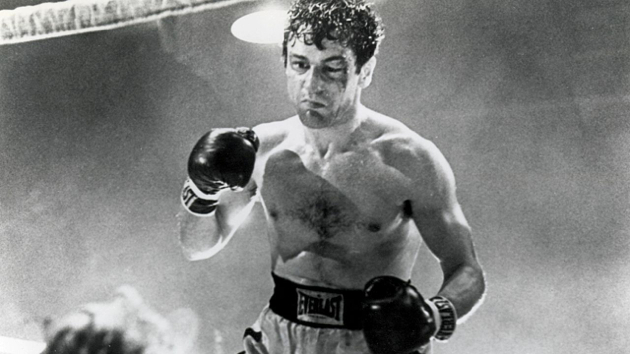
Raging Bull (dir. Martin Scorsese, 1980 USA)
Winner of 2 Academy Awards, including Best Actor and Best Editing, winner of 2 BAFTAs, including Best Editing and Best Newcomer
Todd Brown, Founder & Editor:
Where to start with Raging Bull, a film I knew surprisingly little about beyond the obvious points that it was a key collaboration between Scorsese and Robert De Niro, based on the true story of boxer Jake LaMotta, and features a remarkable physical transformation by De Niro?
Well, let's start with that final bit, shall we? Because while, yes, De Niro packs on the pounds to play old Jake ... really? This is what people want to talk about where this movie is concerned? All he really did was take a three month break and eat the fattiest foods he could lay hands on while doing no exercise whatsoever. I could do this. You could do this. Anyone could do this. It's really not that big a deal. What is a big deal is watching De Niro in his prime, before all his personal quirks became the horrible cliches they are today. That and the realization that while De Niro gets all the acting praise in this film (most of which I'd say is quite deserved) Joe Pesci is even better.
Really, though, the star of the film is Scorsese and the decision to shoot the film in a classic style that fits the 1940s or 1950s far better than when it was actually made, and then to pair that classical black & white photography with dialogue even more brutal than the beatings laid upon the men in the ring. The contrast Scorsese creates between the visual style and the story he is telling is where the real power of the film lies, the juxtaposition of the two lending everything an extra wallop.
Personally I found the story fizzled as it reaches the end, LaMotta was such a brutal and unlikeable man through his rise, that his collapse carries no emotional weight. Of course it all fell apart for him, the only real surprise was how long it took for his wife to leave. That lack of emotional connection limits this one somewhat, so that for me even given the stellar performances and one of the finest pieces of technical direction Scorsese has ever achieved in his career it still ranks as somewhat secondary amongst Scorsese's works: A film to be admired rather than loved.
Andrew Mack, Contributing Writer:
I was abolutely floored by the physical transformation (gaining 60 pounds) that De Niro undertook for the final act. The size of Scorsese's balls to halt production for three months just so De Niro could go to Paris to do it? Talk about putting your trust in your talent. Sorry Mr. Bale, you're efforts for The Machinist now pale in comparison. You've been dropped in the rankings.
And the heavyweight emotional punch of that scene with De Niro in the jail cell. Throughout the film I was left wondering what the appeal of this man was then all that emotional weight just comes crashing down on you. Gosh, the entire movie is so volitile and combustive.; Raging Bull walks along the edge of a knife. You expect the violence in the ring; but nothing prepares you for the violence at home.
There are very few movies that I regret not seeing, or not seeing sooner. Raging Bull is one of those few. For shame.
Shelagh M. Rowan-Legg, Contributing Writer:
Looking over my Full Disclosure list, one thing I've noticed is that the majority of the titles are very much 'guy' films: westerns, gangster themes, all very much about testosterone and violence. I don't know that I've made a conscious effort to avoid these kinds of films; but I do think I've never been interested in excessive violence in film. But I am fascinated by a 'sport' that is really just an excuse for guys to beat each other up. Not that that's a bad thing, I've always had an interest in learning to box. And Raging Bull has long been held up as the canonical film about boxing.
So, was I disappointed? Well, not perhaps from a directorial position. Like my earlier viewing of Mean Streets, I was impressed the quality of European Cinema Verité in the film, the combination of the wonderful score with slow-motion shots of fist to skin, creating quite an elegiac image framed in blood. And again, as with Mean Streets, Scorsese has a natural ear for this kind of language, the rough and the elegant occupying the same space, the same words, and the same character. At least, most of the time.
I've always felt that in narrative features, if your characters aren't likeable, they at least have to be interesting. But what if they are neither? And should that theory apply to biopics? I don't think anyone would argue that the image of Jake La Motta in this film is likeable (though you might at times feel a little sorry for him). But, at least from my perspective, he wasn't interesting either. So I really didn't know how Scorsese expects me, as a spectator, to absorb his representation of La Motta. Was I meant to admire him? Feel sympathy or empathy? Hate him?
I'm not faulting Robert DeNiro's portrayal, which of course is amazing, and makes me lament how terrible he has become over the past several years. And obviously, La Motta was a great boxer. But I was left wondering what was so fascinating about his personality and his life that was worth making a film about. There seemed to be so little in the film of his boxing as opposed to his personal life, and at times I felt a desperate urge to fast forward through the life scenes (except when the wonderful Cathy Moriarty was on screen) to get to the boxing.
While I'm glad I watched Raging Bull, I can't say that I enjoyed it, or will see it again. Maybe there are historical figures that only appeal to a certain demographic.
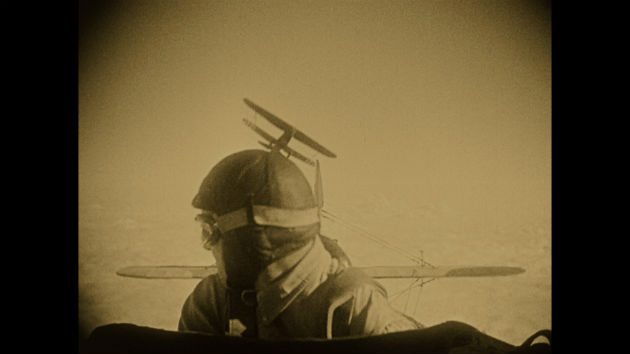
Wings (dir. William A. Wellman, 1927 USA)
Winner of 2 Academy Awards, including Best Production and Best Engineering Effects
Peter Martin, Managing Editor:
Some 86 (!) years after its release, William Wellman's first major motion picture remains a remarkably fresh and vibrant experience. Its status as the first winner of the Academy Award for Best Picture did it no favors in my eyes - what does the Academy know? - and foolishly discouraged me from making it a priority. But watching the film for the first time on Paramount's gloriously beautiful Blu-ray was revelatory, in the sense that I had no idea it was such an entertaining picture, filled with comedy, romance, high drama, and high-flying action.
The air sequences are even more breathtaking after I learned that actors Buddy Rogers and Richard Arlen learned to fly so they could fly their planes - they're captured in the air, starting their on-board mounted cameras themselves. The dogfights have always been justly celebrated, but the action on the ground, recreating battles with thousands of soldiers, is equally impressive. And, though the film may revel in the battles, it also acknowledges the high price of war upon the human soul. This is the type of blockbuster Cinema that should be flooding the multiplexes today.
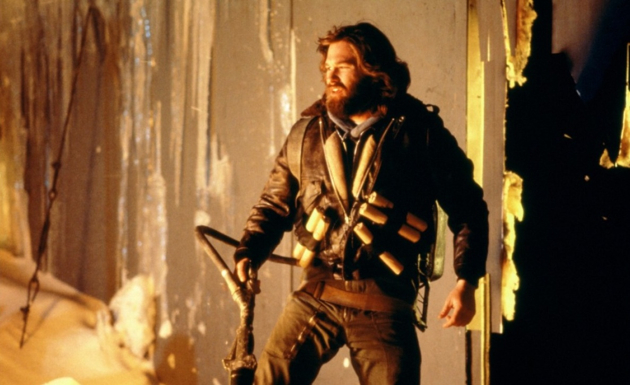
The Thing (dir. John Carpenter, 1982 USA)
Ryland Aldrich, Festivals Editor:
The first in my Full Disclosure mini-focus on classic horror films is John Carpenter's 1982 Antarctic alien thriller The Thing. I was lucky enough that my monthly assignment happened to align itself perfectly with AFI's Night at the Movies that by chance featured The Thing, introduced by the film's star Kurt Russell. This included a pristine print of the film with perfect projection and sound by the Arclight Hollywood. Ennio Morricone's squealing score was an absolute delight and Dean Cundey's cinematography has never looked better.
All that being said, Carpenter's story telling style felt like a bit of a time capsule. This is one of the unfortunate Full Disclosure experiences where the lack of nostalgia factor was a definite minus. Not that I didn't appreciate Kurt Russell's performance or the genuine moments of tension when the Antarctic campers don't know who amongst them has been infected, but the schlocky B-movie elements of scares over plot logic detracted a bit too much to overlook. Had I been able to form that critical early connection to the material that so many of my peers have, I imagine the experience of seeing the film in such a pristine environment would have been much more enjoyable.
Pierce Conran, Contributing Writer:
Though it has come across my radar many times before, I was never particularly interested in watching John Carpenter's The Thing so it's hardly surprising that it has taken me this long to get to it. But as a seminal 1980s film and one of the most beloved sci-fi or horror films out there, I knew it was high time that I get to it. To be honest, as a ScreenAnarchy writer, part of me felt compelled to watch it.
I decided to double dip and also watch the Howard Hawks produced The Thing From Another World (1951). Early horror films, with their wise-cracking dialogue and breakneck pacing, are a delight to watch and this was no exception. With a strong genre premise, a potent alien threat and the earthly danger of vaulting scientific ambition, Christian Nyby's film is a blast, though a bit stilted and probably not essential viewing.
John Carpenter's The Thing is a far more accomplished work that draws from John W. Campbell Jr.'s source novella, Who Goes There? rather than Nyby's 1951 film. What can I say that hasn't been said before? Great pacing, staging, tone and some exceptional body horror makeup and special effects make this one of the landmark genre films of the 1980s if not of all time. I wish I hadn't bypassed it when I was a teenager as I imagine it would have been so much fun to watch back then.
However, I find that as I grow older I am becoming more drawn to genre cinema so this double bill was a real treat for me, though I'm not sure I'll be giving the 2011 version a go any time soon. But what I will do is keep digging deeper into genre film.
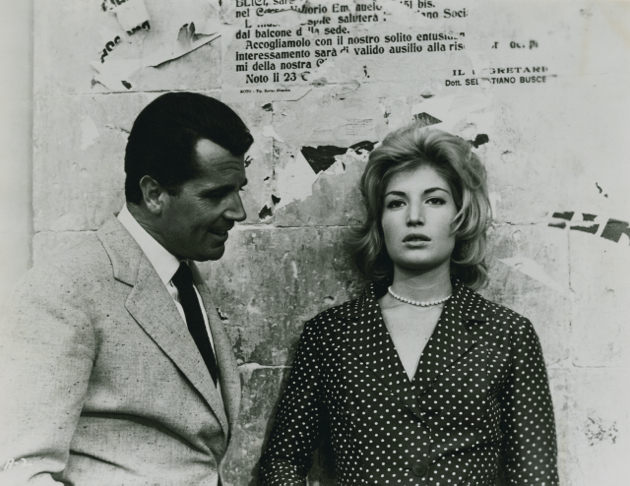
L'Avventura (dir. Michelangelo Antonioni, 1960 Italy)
Winner of the Jury Prize at Cannes Film Festival, nominated for 2 BAFTAs including Best Foreign Actress and Best Film from any Source
James Marsh, Asian Editor:
More than any other filmmaker, the works of Michelangelo Antonioni for me personify the impenetrability of classic European Arthouse Cinema - those films about which everybody raves, which sooner or later you know you will have to endure despite feeling like something of a chore. Never has exploring Cinema felt more like work than while watching the films of Antonioni.
That is not to say that I don't admire his films, or recognise the talent both behind and in front of the camera, just that I wish Antonioni possessed even a glimmer of urgency in his storytelling. L'Avventura is the fourth of Antonioni's films I have seen, following Zabriskie Point, The Passenger and Identification of a Woman. No doubt his fans will argue I'm doing this backwards, tackling his later, less accomplished works first, and giving me a skewed perspective on his oeuvre, but that's just the way things have turned out. We will all survive.
L'Avventura is arguably the director's most famous film, and marks the first in a loose trilogy of films that includes La Notte and L'Eclisse. It stars Gabriele Ferzetti (best-known to me as Draco from On Her Majesty's Secret Service) and Monica Vitti - the director's regular muse. The title translates not as "The Adventure" as I had assumed, but "The Affair" and charts the passionate tryst between a husband and his wife's best friend after she mysteriously disappears on a sailing trip.
Personally, I found the 143-minute film incredibly tedious, and the least enjoyable of the director's works I've experienced to-date. It is beautifully shot and the performances are well executed, but Antonioni's pacing, coupled with the amoral actions of his characters were incredibly frustrating. While she may look gorgeous, Monica Vitti's Claudia is needy, insecure and paranoid, embodying many of the most infuriating traits I have wrestled with when romantically involved with women in the past. Ferzetti, conversely, is a flagrant predatory tart who proves impossible to empathise with. Ultimately I found myself siding with the missing Anna (Lea Massari) - and wished I too could escape this insufferable pair forever!
After seeing the film - in a slightly tattered but still preferable 35mm print at the Hong Kong Film Archive - I tweeted my disdain for Vitti's character, only to find myself engaged in a short back & forth with noted film critic Jeffrey Wells. Little did I know that Wells - and by extension his readership - would react so passionately. Click here to witness the bizarre results of that brief exchange.
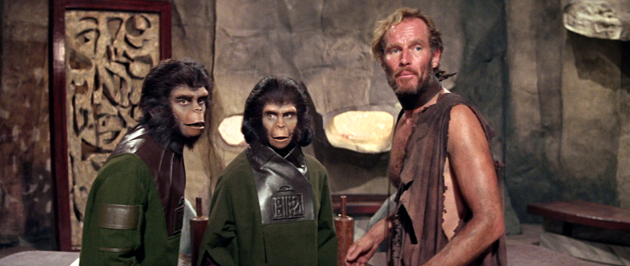
Planet of the Apes (dir. Franklin J. Schaffner, 1968 USA)
Winner of an Honorary Academy Award for Outstanding Make-up Achievement
Ben Umstead, East Coast Editor:
Like last month's entry The Shining, Planet Of The Apes was a film I was well aware of long before first viewing. And just like The Shining, my first exposure to Apes was thanks to The Simpsons. Anybody remember the break-dancing inflected number "Dr. Zaius" in that Troy McClure-starring Apes musical? Perhaps it was because all the big reveals in the film were spoiled well before I could truly grasp or appreciate their meanings that I never managed to sit down and actually watch the film. Perhaps I thought the idea was cheesy. But I saw the Tim Burton remake (awful in its own right, doubly so now that I've seen the original), and even greatly appreciated Rise Of The Planet Of The Apes for being a fairly intelligent and exciting studio production.
So here we are in 2013 and I have finally seen the Franklin J. Schaffner original, and boy is it glorious! It's a fast-paced, visceral adventure film to satisfy any 12-year old hankering for a fine survival tale, with just the right amount of pulp and grit and macho, pessimistic posturing. The first forty minutes chronicling the crash of the astronauts and subsequent journey across what will become known as The Forbidden Zone are without a doubt the most purely thrilling trek scenes I've watched in ages. Leon Shamroy's widescreen cinematography is consistently breathtaking, Jerry Goldsmith's score still sounds radical and new, inviting us into a dangerous new world... a world of man and ape, and their fantastic clash of wits. Needless to say I was on the edge of my seat. And then Charlton Heston's first encounter with the primal humans, and that terrifying call which sends them running - and here we have the apes galloping in on horseback! It was at this moment that I was nearly kicking myself for having never seen this. Oh boy, was the 12-year old me ever cross with the 29 year-old.
And then we're in the village of the apes, Heston's astronaut Taylor is faced with what seems a completely bizarre reversal of realities -- humans are considered a lowly beast, and it is the apes who reign supreme! While characters remain fairly close to archetype, the politics of the film steadfastly black and white, it is in fact this starkness, this immediacy, which makes the film still very potent and relevant. Perhaps more powerful in 1968 than the Statue of Liberty reveal would have been the inter-species kiss between Taylor and the progressive Dr. Zira, an apt, thrilling and poignant analogy to the civil rights movement of the day, if there ever was one. So, yes while we can certainly call Planet Of The Apes a film of its time, it will undoubtedly be an important film for all times. That is until we as humans can come to unconditionally love ourselves, our planet and all other living things.
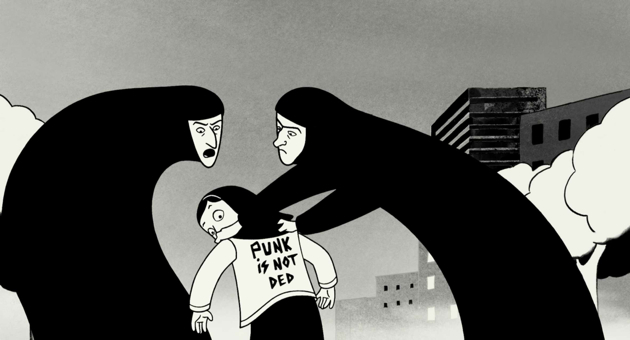
Persepolis (dir. Vincent Paronnaud, Marjane Satrapi, 2007 France)
Winner of Jury Award at Cannes Film Festival, Winner of 2 Cesar Awards, including Best First Film and Best Adapted Screenplay, Nominated for the Academy Award for Best Animated Feature
Ard Vijn, Contributing Writer:
2008 was a special movie-year for me, as it was then that I got my first press accreditation, for the International Film Festival Rotterdam. For the first time I practically engorged myself on films, interviewed directors, got a glimpse of whatever happened behind the scenes. I saw the first international screening of Let The Right One In and wrote what I believe to be the split first English-language review for that film (well, the ScreenAnarchy and Variety reviews were only minutes apart...).
My wife, in the meantime, just picked two films to go see with her friends. And as usual, she annoyingly managed to pick the festival's eventual audience price winner: the French animated feature Persepolis. And I've been hearing about it EVER SINCE.
Thing is, I did plan to see it myself but it didn't fit my festival schedule. It is one of the first Blu-rays I ever bought, certainly the first one which was cheaper than 10 Euros. It's been on Dutch television several times already. The act of "Seeing Persepolis" has been burning a hole in my to-do list for five years now. So thank you James for this list, because it made me scratch this particular itch.
And of course I love the film. In it, Marjane Satrapi tells about growing up in Iran during the revolution. During a very rebellious adolescence her parents send her to Europe, but when she returns to Iran a few years later, she has become a stranger in her own country. Truth be told, she is honest enough about her own volatility that you can wonder if she'd ever fit in anywhere, even in the most stable of countries. It gives the narrative a special tension to have her walking around as a ticking time bomb, in such a restricted society as Iran during the eighties and nineties.
The film is completely animated, based on the illustrations of Marjane Satrapi's graphic novel, and it looks fantastic, shifting between realistic and abstract styles without discord. Persepolis is a unique-looking piece of art, showing what a shame it is that most other animated films so often use the same few techniques.
That it won the audience award in Rotterdam actually fills me a bit with pride of my hometown: it is an intelligent film about a difficult subject, hardly a crowdpleaser. That it took ME so long to see it takes that pride away again of course. Maybe I should start listening to my wife again, come the next festival?

Do you feel this content is inappropriate or infringes upon your rights? Click here to report it, or see our DMCA policy.





